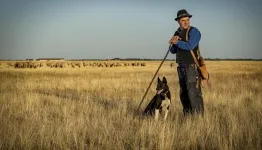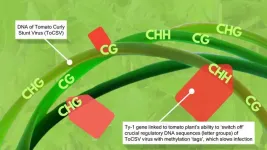(Press-News.org)
It is well known that biodiversity of cultural landscapes is threatened by land abandonment and agricultural intensification. Traditional, low chemical and machinery input management systems have long been acknowledged for their diverse benefits to maintain and enhance biodiversity, however, the recognition of traditional knowledge, on which these traditional management practices are based, started only relatively recently. The recognition of traditional knowledge holders themselves is an even more recent phenomenon. A recently published paper aims to help increase recognition and respect towards these people, and through this, also support the conservation and restoration of species-rich cultural landscapes across Europe.
“Traditional knowledge holders are small-scale, traditional farmers and herders, but also many forest users, hunters, fishers and foragers that know, manage and steward their surrounding environment based predominantly on traditional knowledge and practices”, explains Zsolt Molnár, the lead author of the study. "Across Europe, we've seen that the lack of recognition towards these people may easily lead to social injustices".
The authors of the study summarized their experience on social injustices and their consequences to conservation. They found social injustices spanning from disrespect by the society and misrepresentation in public mindscapes, invisibility in the media, misunderstanding by scientists and other stakeholders, economic and political vulnerability caused by inappropriate regulations and unfair market competitions, unethical collaborations, rights violations, uncontextualized education to lack of inclusivity in conservation planning and management.
Let's look at some concrete examples: Traditional knowledge-based farmers mostly manage smaller farms, while larger farms benefit disproportionately from agricultural subsidies. Moreover, former have bureaucratic and structural disadvantages when applying for subsidies, resulting in billions of euros being misspent from a social and conservation perspective. Hungarian herders have a highly respected heritage of folk dances, cloths and handicrafts but no meaningful formal participation in protected area management, even where conservation grazing is vital. The continuity of Spanish trashumant pastoralism depends partly on its related knowledge, which is linked to the maintenance of trashumance of foot. This practice is threatened by legal disadvantages of long-distance mobility between different governing entities. The traditional Sámi calendar of ptarmigan hunting conflicts with the imposition of national hunting season regulations in northern Fennoscandia. Hunting is allowed to start earlier, which results in substantial extra disturbance towards the birds by non-local hunters. The European Union and its member states have diverse responsibilities under international instruments to ensure that traditional knowledge holders can continue their ways of life (if they wish to do so), that is so often beneficial for conservation in cultural landscapes.
The scientific literature reviewed consistently shows that resolving these social injustices would result in simultaneous benefits both for people and nature. The urgency of resolving these social injustices becomes even more apparent in the wake of the recent adoption of the EU Nature Restoration Law. Traditional knowledge holders can and should play a prominent role in the implementation of this ambitious program. ”Conservation rangers wouldn’t talk to us 20 years ago. They criticised us without asking us anything. Now they stop and we can talk about pasture management. We agree on about 90% of things. The difference between them and me is that for the rangers, it’s all about the plants [protected plant species], but for me it’s all about the animals [livestock].”, says László Sáfián, a traditional shepherd from Hungary, one of authors of the study. “If you know in which season and how a heavily degraded weedy pasture needs to be grazed, by cattle or sheep, under the supervision of a good herder, you can restore it much easier than with a machine, and for lower costs”, he added.
Indeed, well-established evidence shows that mutual understanding and respectful collaboration between traditional knowledge holders and conservationists can lead to better compromises in conservation management and regulations. Improving recognition also underpins the success of the Kunming-Montreal Global Biodiversity Framework that aims to halt and reverse further loss of biodiversity. Fortunately, there is an increasing number of good examples of how social injustices are being actively resolved and/or prevented in Europe e.g., eurovia.org, perspektive-landwirtschaft.at, ganaderasenred.org, kvann.no, terra-lemnia.net/en.
The ongoing functioning of low-external-input agricultural systems is vital for European food resilience in an era of pandemics, energy crises and as a response to mitigate the impacts of Russia’s invasion of Ukraine. It is not enough to save traditions for folklore stage performances and skanzens, the only possible way to keep alive traditional knowledge and practices is to maintain their adaptive character. Sustaining traditional knowledge requires safeguarding not only the knowledge itself, but most importantly, the social and ecological spaces where this knowledge is enacted, transmitted and shared.
Not only rare and threatened animal and plant species but the vulnerable and often-forgotten traditional knowledge holders of Europe call for urgent action. Including the resolution of the many social injustices they continue to face while struggling in making a living in some of Europe's most biodiverse landscapes.
END
Amsterdam, Netherlands – 26 Aug 2023: Is the routine implantation of an implantable cardioverter defibrillator (ICD) in myocardial infarction survivors with heart failure still an adequate therapy for prevention of sudden cardiac death? The PROFID EHRA trial is set to answer this question in a large, multicentre, EU-funded study set to enrol the first patient this summer. The consortium of partners and colleagues involved in the trial, including the European Heart Rhythm Association (EHRA) of the European Society of Cardiology (ESC), will meet during ESC Congress 2023 to discuss the start of the study.
Myocardial ...
Amsterdam, Netherlands – 26 Aug 2023: Cardiovascular disease (CVD) cost the EU an estimated €282 billion in 2021, according to late breaking research presented at ESC Congress 2023.1 Health and long-term care accounted for €155 billion (55%) of these costs, equalling 11% of EU health expenditure. The analysis was a collaborative effort by the European Society of Cardiology (ESC) and the University of Oxford, UK.
Study author Dr. Ramon Luengo-Fernandez of the University of Oxford said: “CVD had a significant impact ...
NIH-funded study supports use of ECMO for critically ill patients with obesity
ECMO does not appear to complicate treatment for severe respiratory failure for adults with obesity
A National Institutes of Health-supported study suggests that adults with obesity may benefit from the use of extracorporeal membrane oxygenation (ECMO), an advanced form of breathing support, when in intensive care for respiratory failure. ECMO’s use was previously questioned for patients with obesity due to the belief that it may complicate ...
About The Study: Muvalaplin was not associated with tolerability concerns and lowered lipoprotein(a) (Lp[a]) levels up to 65% following daily administration for 14 days in this first-in-human phase 1 study involving healthy participants. Lipoprotein(a) is associated with atherosclerotic disease and aortic stenosis. Longer and larger trials will be required to further evaluate safety, tolerability, and effect of muvalaplin on Lp(a) levels and cardiovascular outcomes.
Authors: Stephen J. Nicholls, M.B.B.S., Ph.D., of Monash University in Clayton, ...
Anyone who’s been caught in an unexpected downpour knows that weather forecasting is an imperfect science. Now, researchers at Stevens Institute of Technology are taking aim at one of meteorologists’ biggest blind spots: extremely short-term forecasts, or nowcasts, that predict what will happen in a given location over the next few minutes.
“This isn’t just about whether you should take your umbrella with you when you go on a walk,” said Temimi. “The forecasts that we’re missing – the ones that look ...
About The Study: In this study of 111,000 U.S. military veterans with coronary artery disease, suboptimal lipid-lowering therapy was prevalent in the clinical setting. Optimization of statin therapy was projected to produce clinically relevant reductions in the risks of death and cardiovascular events. Despite a lesser lipid-lowering efficacy of ezetimibe, its widespread use on a population level in conjunction with optimized statin therapy may be associated with further meaningful reductions in cardiovascular risk.
Authors: Gregory G. Schwartz, M.D., Ph.D., of the Rocky Mountain Regional VA Medical Center in Aurora, Colorado, is the corresponding author.
To ...
COLUMBUS, Ohio – White-tailed deer across Ohio have been infected with the virus that causes COVID-19, new research has found – and the results also show that viral variants evolve about three times faster in deer than in humans.
Scientists collected 1,522 nasal swabs from free-ranging deer in 83 of the state’s 88 counties between November 2021 and March 2022. More than 10% of the samples were positive for the SARS-CoV-2 virus, and at least one positive case was found in 59% of the counties in which testing took place.
Genomic analysis showed that at least 30 infections in deer had been introduced by humans – ...
A recent analysis of all relevant published studies reveals a lack of evidence to determine the dosing, safety, and efficacy of medical marijuana or cannabis-containing products for managing symptoms experienced by children with cancer. The analysis is published by Wiley online in CANCER, a peer-reviewed journal of the American Cancer Society.
Although treatments for childhood cancer have improved significantly, even leading to cures for many patients, many children still suffer from symptoms such as pain, anxiety, and weight loss related to cancer and its treatment. Over the last decade, cannabis ...
How tomato plants defend themselves against a devastating ‘young’ Southern African virus has now been investigated at a molecular genetics level for the first time by researchers at the University of Johannesburg (UJ).
The Ty-1 gene is known to confer resistance to the well-known tomato yellow leaf curl virus (TYLCV). UJ researchers investigated what happens when tomato plants that harbour the Ty-1 gene are infected with the relatively unknown tomato curly stunt virus (ToCSV). They found a link between tolerance to ToCSV, a plant defence called viral DNA methylation, and Ty-1 gene activity.
The research is published ...
New research finds that sleep can be most efficient and restful for older adults when nighttime bedroom ambient temperature ranges between 68 to 77 °F.
The authors observed an overall trend: a 5-10 % drop in sleep efficiency as the nighttime ambient temperature increases from 77°F to 86°F. Importantly, this research also reveals substantial between-individual differences in optimal bedroom temperature.
“These results highlight the potential to enhance sleep quality in older adults by optimizing home thermal environments and emphasizing the importance ...




